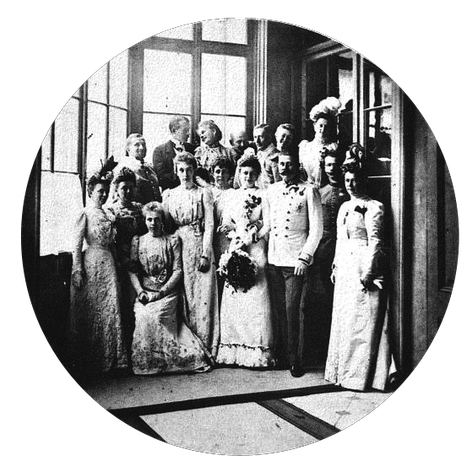
Wedding fever: UK royals 2011 vs fin-de-siècle Austria-Hungary
Published on
In case you haven’t heard, on 29 April Prince William is to marry Kate Middleton in a royal ceremony at Westminster Abbey. Once upon a time, on 1 July 1900, in Reichstadt, Bohemia, Franz Ferdinand, Archduke of Austria and heir to the throne of the Austro-Hungarian Empire, married his lover of five years
Although an aristocrat, Countess Sophie Chotek was a commoner according to the strict marital requirements of the Habsburg dynasty. A morganatic marriage was imposed to satisfy the absurd demands of an empire seemingly at its zenith. Yet just fourteen years later, the Archduke’s assassination in Sarajevo triggered a war across Europe and blew the cover off a decadent and rotten empire, distracted by celebratory pomp and circumstance and a peculiar popular attachment to their feudal overlords in the shape of the Habsburg monarchy. The war was merely the final blow that sealed the fate of a stagnant and decrepit social system, unable to connect with modernity and meet its challenges.
Over a century later, the upcoming wedding in the former imperial capital of London is quite a different beast. Our society is profoundly different from fin-de-siècle Austria-Hungary. It is more open than the Habsburg’s subjects could ever have imagined. The struggles and evolutions of the twentieth century have created a fundamentally egalitarian society. We live in an era of globalised individualistic capitalism, where social standing is independent of breeding. Unlike poor Sophie, Kate Middleton, as a commoner, is accepted on equal terms and spared the indignities forced upon the former. We comfort ourselves with the notion that we have moved on and laurel wreaths are now bequeathed through meritocratic selection, while Kate’s ascendancy is taken to represent the triumph of rags to riches over blue blood; the final capitulation of royal privilege to the folksy charm of the, albeit très riche, bourgeoisie. But the mass hysteria surrounding the regal nuptials suggests that fascination with feudal overlords has not been a casualty of democracy. Rather it has evolved into something else.
The shrill inanity of much media coverage of the event (yes, we know we're adding to it), differs from the deferential reverence accorded to the aristocracy of yesteryear. The idle chatter fits more comfortably into a pre-existing discourse of celebrity gossip and tittle-tattle, used to ‘entertaining’ us with sordid details and trivia. The royal wedding is merely the culmination of our cult of mediocrity. If we have excised hereditary privilege from our societies, we have left the privilege intact and our media cast about for the next empty carcass to briefly illuminate with the glare of celebrity, before casting the lifeless body aside in its insatiable quest. Prince William and Kate are merely the latest, and perhaps most grandiloquent, manifestations of our asinine obsessions; a marriage of convenience between royal gravitas and a celebrity-driven culture high on twenty-four hour newsfeeds and endless gossip columns. Some commentators have read the outpouring of global interest as a reassertion of the British monarchy, a sign of nostalgia for an old social order. But the hyper-mediatised event is a symbol of the monarchy’s submission to a more powerful force: celebrity and media-led brand capitalism.
The obsession with the royal wedding is a manifestation of our culture’s prurient interest in the lives of those whom, through overexposure, we feel we know. Witness the pages devoted to trivial questions, such as choice of dress, size of ring, guest lists. It represents the victory of minutiae in a world of instantaneous communications, in which all eyes must look to the same point at the same time, so that we can rejoice in a collective sense of ‘having been there’. It also provides a useful fairytale for a world increasingly driven to escape into fantasy, where one’s reality is constructed with the bricks of material possessions and one can even live in a town built by the Disney corporation.
Meanwhile, we are distracted from more important, and tougher, questions. Global events are moving at an accelerated pace and at an era-defining scale. Winds of change are blowing through the Arab world, sovereign debt crises and migration disputes threaten to unravel the European Union, the prospect of famine rears it ugly head as commodity prices soar. To top it all, we are running out of time to defeat climate change. These global problems catch us looking the other way, complacently fiddling while Libya burns. With our media dominated by this powerful opiate, who needs the churches to distract us anymore, except, of course, as the venue for this royal hubris. There is much serious thinking to be done, but wait; I must gorge myself on asinine trivialities. To this orgy of indulgence not becoming the pompous death rattle of yet another decadent civilisation.
Image: main (cc) Wikimedia/ scanned from book Das k.u.k. Photoalbum by Franz Hubmann



